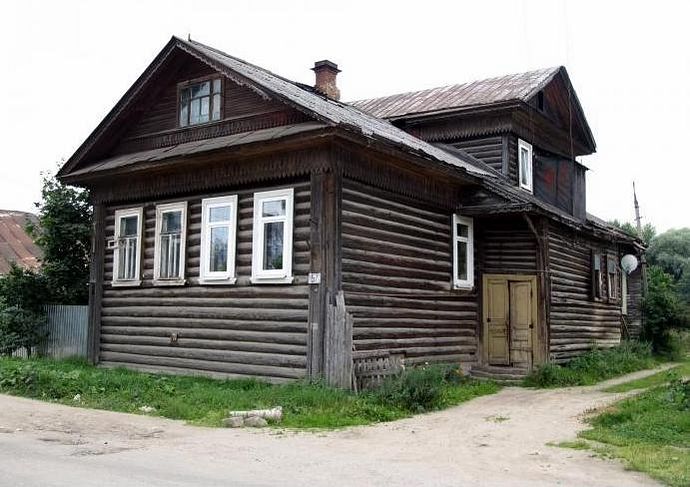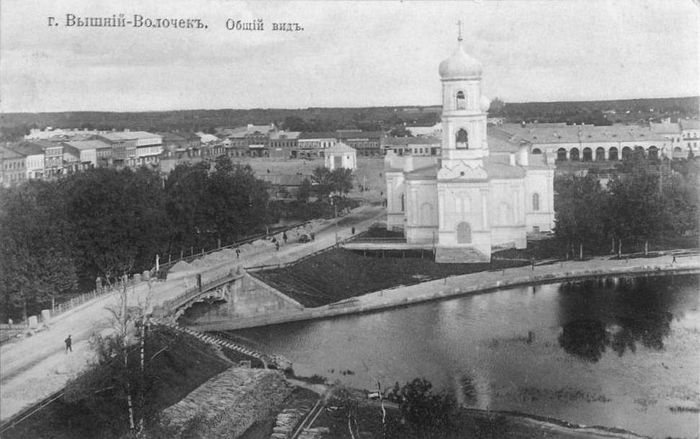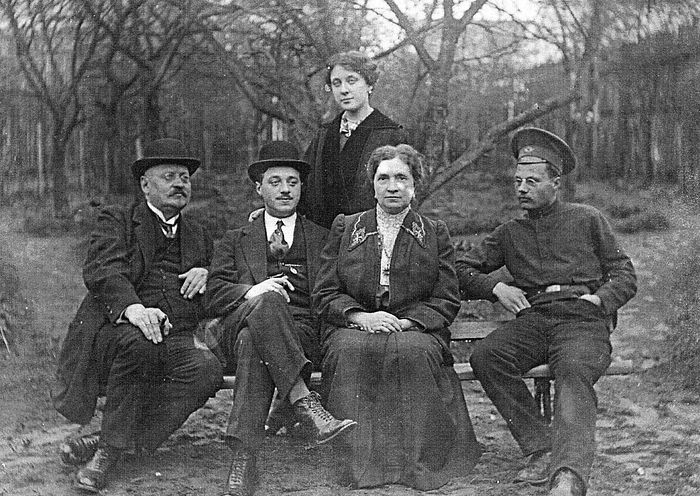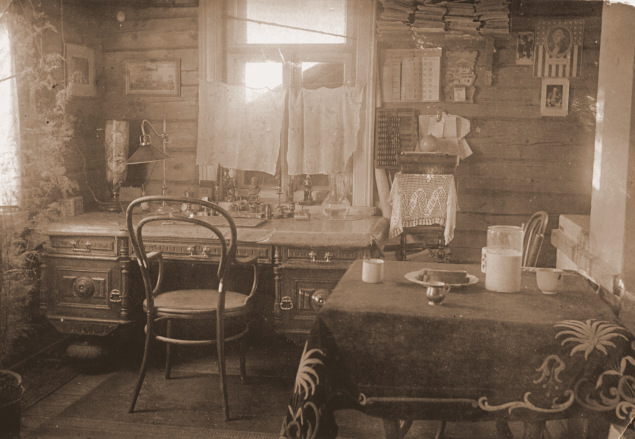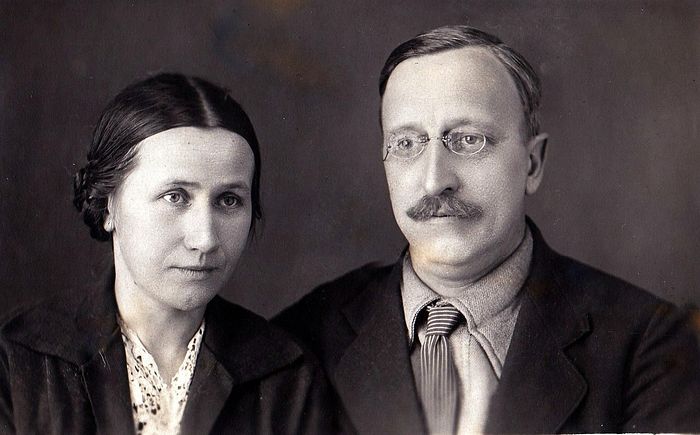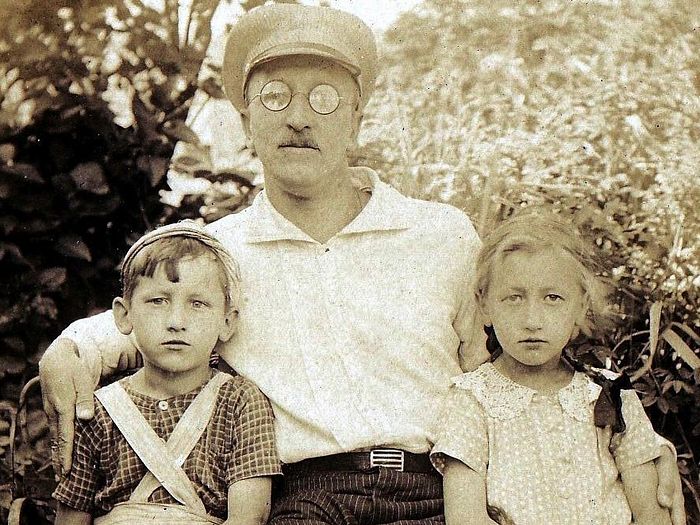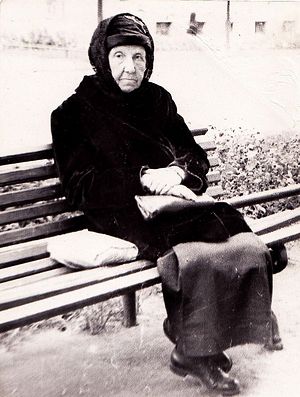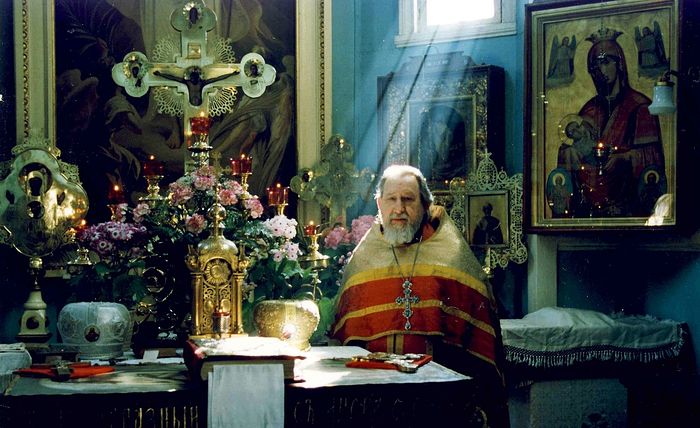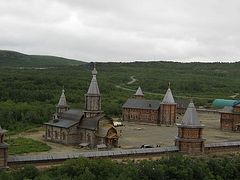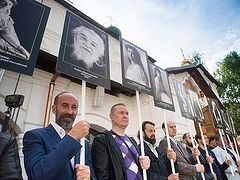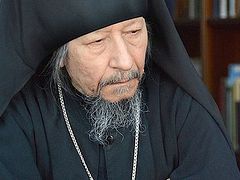The residents of Vyshny Volochek, Tver Province [between Novgorod and Moscow], Russia came forth with the initiative to open a museum of New Martyrs and Confessors of their town. They propose to set up the museum in a condemned wooden house at 67 Uritsky Street. This house was home to many remarkable people and memorable events. But most importantly, this house was a church.
When the Church of the Theophany, the last Orthodox church in Vyshny Volochek was shut down, this was the house where the parishioners held secret worship services. When the owners of the house were arrested and all their relatives and friends, stricken by fear, turned their backs on the “children of the enemies of the state”, this house witnessed another act of courage as the children were saved by selfless people who became their guardians.
Secret churches do not have domes with golden crosses and maybe that is why people tend to forget about them so quickly. However, the liturgical grace does not depend on where the Liturgy is held, and an angel of the Lord is invisibly present anywhere where the name of God is invoked. Now this house awaits its fate. Municipal authorities have already decided to tear it down, but people of faith want to turn it into a museum of the New Martyrs.
Alexey Ivanovich Malyshev, a linen merchant well-known in Vyshny Volochek, built this wooden house in 1926, when he had to vacate his stone house on Vanchakova Lane. He was a merchant of the First Guild and a warden of the nearby Convent of the Kazan Icon of the Mother of God. However, the new authorities didn’t leave him alone in his new house either. At Christmastime of 1930, a pogrom was organized that lasted a week, and two years later the owner was exiled to a tree-felling labor camp. When Alexey Malyshev was released from the camp, he decided not to tempt his fate and immigrated. His son, Boris Alexeyevich Malyshev, continued to live in the garret of the house with his wife Maria Nikolayevna and their two children, Modest and Olga. Boris and Maria were parishioners of the Church of the Theophany and actively protested the church’s closure in 1940. Maria Malysheva and the church’s warden even travelled to Moscow to submit the parish’s petition to the authorities. The authorities shut down the church anyway, and people of faith started holding worship services at their homes.
Boris and Maria Malyshev were from that generation of people who became religious after the revolution of 1917. At the time of their arrest, he was an accountant and she worked as a teacher. They were a happy, affectionate couple raising their children in love and faith. Boris’ daughter always remembered the poem that her father wrote for her:
Important Advice
God’s world is so superb. The greatest bliss
Would be to understand its foundation
Do all you can to be a part of this
Beautiful and Divine creation
The Book of Books will be your guiding light
Know yourself, and work hard night and day
Stand for the truth, and from evil take flight
And always love, believe and pray
The parents tried to protect their children from the influence of the atheist environment, so Boris taught his daughter himself, using his old textbooks. However, this became too risky and the Malyshevs enrolled Olga into the second grade class of the same school that Boris attended with his older friend Nikolai Vorobyev, who later became the well-known spiritual father, Igumen Nikon. The family continued its life, praying and raising the children in faith.
Olga Borisovna, the Malyshev’s daughter, recalls that one August evening of 1940 they were drinking tea on the balcony of their house when they suddenly they saw a small cloud forming in the clear sky. Gradually this cloud turned into an eight-pointed cross with two four-pointed crosses, one to the left and one to the right. Both parents and children froze for a moment, watching this image of Golgotha. Then Maria said, “Well, this is our Golgotha…”
The authorities started keeping tabs on the Malyshevs as early as 1937 when their daughter Olga refused to join the Young Pioneer Organization, firmly professing her belief in Christ. During that dreadful year, Boris and Maria feared that the secret service agents would come and arrest them at night, so they even gave their children instructions what to do if one day they would wake up to find that their parents are gone. But it wasn’t their time yet. Later, Maria drew attention to herself when she became one of the 20 founding members of the Church of the Theophany, the last functioning church in Vyshny Volochek, and when after the church was shut down she and the church warden went to Moscow to deliver the petition to Stalin requesting to reopen the church for worship services. They delivered the letter, but the church was permanently shut down. Thus since 1941 the worship services were secretly held in the houses of some of the parishioners, including the house of Boris and Maria.
During the worship services, Boris Malyshev’s desk served as the table of oblation, while an inconspicuous little table that was not used for any other purpose functioned as the liturgical altar table. Olga Borisovna Anisimova, the Malyshev’s daughter, remembers that on Pascha day she and her little brother carried miniature holy banners, walking at the head of the small procession they held inside the house.
During the unsettling days of the fall of 1941, the authorities arrested many people who they considered potential supporters of the Nazi occupants. Participants of the secret worship services were among those who were arrested. On October 18, 1941, secret service agents, the so-called “soldiers of the invisible front”, burst into the Malyshevs’ house. This was a very difficult time for the entire country as the Nazis were drawing nearer, preparing to hold a victory parade in Moscow. In Vyshny Volochek, the authorities initiated the “purge” to remove the people they believed were potential supporters of the Nazi occupation, including monks, nuns and other “unwanted” people. In a week, the well-oiled mechanism perfected in 1937 pigeon-holed the Malyshevs and their acquaintances as an “anti-Soviet faction”. The arrests of the religious people of Vyshny Volochek ensued after the tragedy of a faint-hearted priest who gave away the names of the participants and locations of the secret worship services, including the Malyshevs’ house.
The arrest was inadvertently witnessed by Igumen Nikon (Vorobyev) who was a friend of the family.
The search of the Malyshev’s house lasted all day. Anyone who came to visit them on that day was apprehended. According to God’s will, among them were secret nun Marina (Izotova) who was exiled from St. Petersburg and Igumen Nikon (Vorobyev). A week later, when the verdict was read, the exiled nun Marina became the guardian of the Malyshev’s children. Exiled Igumen Nikon was helping them throughout the war in word and deed. All relatives and acquaintances turned their backs on the children after their parents were arrested, but God sent this monk and nun, these excellent guardians, to help the children so that they would not have to live in an orphanage or die of hunger.
Boris and Maria Malyshev were sentenced to ten years of labor in a prison camp. People succinctly labelled this exile to the forest-based camps as “the green execution”. The Malyshevs were sent to the infamous Vyatlag, the NKVD’s (People’s Commissariat of Internal Affairs) camp with the worst living and working conditions and high rate of inmate mortality. One-third of the Vyatlag inmates perished in 1942. The unusually harsh winter of 1941-42, when the temperature dropped as low as 40 degrees below zero, made the situation even worse. Hearing, reading or thinking about the things that the inmates had to endure would make anybody shudder.
OLP-2 labor camp in Sorda Village was the last point of their shared journey on this earth. People thought that they were namesakes from the same town, so they were inseparable, living in different barracks but at least in the same camp. Maria passed away on April 13, 1942. She was buried in one of the last coffins, after her death all deceased inmates were simply thrown into a pit. Boris was told that she was getting worse the night before. He came to see her in the morning only to learn that she had passed away. When he saw her, he was shocked to see how much the face that was so dear to him has changed. She died of chronic diarrhea, edema and scurvy. These were typical diagnoses for the camp inmates. He closed her eyes himself, read all the prayers that he could remember and took her little pillow as a souvenir. Later, he would die with his head on this pillow.
When Olga received her father’s letter, she started hopping with joy, holding the white triangle-folded letter in her hand. Then her heart sunk as she read simple and devastating words, “Our dear beloved mother has passed away…”
In August 1943, Boris was transferred to the ward for dying inmates. Sensing his approaching death, Boris saw an icon of the Mother of God in a dream. He never saw this icon before. In the horrific reality of the camp routine, this dream felt like a warm breeze, similar to the warmth he felt seeing the handwriting of his children on letters from home.
Modest and Olga prayed zealously for their father. Nun Marina (Izotova) and Hegumen Nikon (Vorobyev) joined them in their prayers. The children were reading Akathists to St. Nicholas, while nun Marina asked the Mother of God for help, praying before the miracle-working Tolga icon of the Mother of God that she revered the most. God heard their plea. Boris was released. In October 1943, on the way home he wrote, “I am so weak that I can barely move my feet. All my belongings were stolen. As I am a helpless old man, it takes two people to help me board the railway car. I walk slowly and fall frequently. My left leg cannot move at all, only bones and skin are left. I’m alive only by the grace of God.”
Vyatlag turned Boris into a feeble old man; nobody could believe that he was only forty years old. Facing uncertainty, he heard many stories about the released inmates who were later arrested again and given longer sentences. How would his children feed him? At least he could die in their arms… He was saved by his late wife’s sister, Valentina. She visited him at the camp two times and brought care packages for him. After Boris’ release, nun Marina asked Valentina and she agreed to take him in. Maria and Valentina were brought up in two different orphanages and were very different. Maria was religious, while Valentina became an atheist. However, at the moment of truth Valentina acted like a true Christian—even though she was a Communist, she opened her house to the “enemy of the state”.
Valentina and her husband lived near Yaroslavl, not far away from the closed Tolga Convent. Soon after Boris moved in, the ever-watchful armed comrades came to the house, saying that a former camp inmate without a residence permit cannot live in the house with two Communists who were employed by a defense industry factory. Valentina ran to talk to the party official of the factory. He suggested that she should talk to one of the four passport office managers in Yaroslavl as only these officials were authorized to do anything with such a request. Valentina and barely mobile Boris managed to get to Yaroslavl, make an appointment and plead with the manager to give Boris a residence permit for a month. The miracle of human mercy repeated three more times.
When Boris got better and was capable of leaving the house on this own, he went to the closest church and saw the very image of the Mother of God that he saw in his dream in Vyatlag. It was the miracle-working icon of the Tolga Mother of God that was saved by the faithful when the convent was shut down…
God saved his life and Deacon Boris Malyshev dedicated the last years of his life to serving in the altar. The years spent in Vyatlag soon caught up with him and he passed away, but he managed to do the main thing—he guided his son Modest to the path of serving God. In his letter sent from the newly opened Leningrad theological seminary, he encouraged his son to serve God: “He gave life to you, He saved you, He made everything necessary to make you His warrior, the preacher of His Divine words… About three days ago I visited with Fr. Seraphim of Vyritsa and he said that you should apply [to the seminary], and that your application would be accepted.”
In May 1949, Deacon Boris Alexeyevich Malyshev reposed in the house on Uritsky Street. The letters of Igumen Nikon sent to nun Marina when she stayed in the Malyshevs’ house demonstrate the spiritual and everyday problems they both faced all their lives when they were taking care of Modest and Olga. These letters, containing practical advice interwoven with spiritual guidance, are perceived quite differently when you know who the addressees are. Even when he was serving far away from Volochek, Fr. Nikon supported nun Marina, who became his spiritual daughter, reminding her that taking care of these children was the duty entrusted to her by the Divine Abbess herself.
The Malyshevs’ children followed in their father’s footsteps: Modest became a priest, while Olga married a priest. Mitred Archpriest Modest Malyshev, the rector of the Holy Prince Vladimir church in Lisy Nos village near St. Petersburg, was a great confessor who influenced the fates of many people. Having experienced more than his fair share of sorrow, he was able to console others in their time of sorrow and suffering. He fulfilled the wish of his father and became a preacher of the Divine word and the defender of love and faith, dedicating all his talents and knowledge to serving God.
Igumen Nikon (Vorobyev) once said, as if addressing our contemporaries, “Our generation was literally the manure for the generations to come. Our descendants will never be able to understand what we lived through. We got what we deserved. What will you deserve? It is unlikely that you are better than us. May the Lord save you from repeating our fate!” This sacrifice was not in vain, for the blood of thousands of martyrs purified the country from sin. It is the prayers of these martyrs that keep us alive today.
It is gratifying that a new generation of Christians is taking over. Denis Ivlev, a priest’s son and the local historian of Vyshny Volochek, came up with the initiative to open the museum of Confessors of the Faith of Vyshny Volochek in the Malyshev’s house. He says that among only those New Martyrs who have been canonized, twenty-two people are historically associated with this area and there is no doubt that research will discover new names to add to this list of New Martyrs. Each of them deserves to be featured in the museum that will gather information about them, so that people would remember these martyrs and those times when religion was persecuted. Nun Theophylacta (Levenkova), the abbess of the Convent of the Kazan Icon of the Mother of God, supported this good initiative and applied to the municipal authorities with a petition to transfer the title to the house to the convent. The Malyshevs’ house, this silent witness of the suffering experienced by the faithful in times of persecution, would be one of the most fitting places to remind people of those times.
Will the municipal authorities hear the Church’s plea to protect this memory? Or will this house church be demolished?

